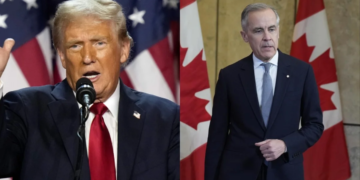President Donald Trump declared “Liberation Day” as a new policy direction when he launched substantial tariff increases through an executive order on April 2, 2025. Elon Musk as CEO of Tesla has joined a complex negotiation process between the administration and industry leaders. All due to his concerns about how these changes could affect the automotive sector. What will be the outcome of this Trump Vs Elon tariff dispute?
Tariff Measures
New United States trade policy subjects all imports to standard 10% duties and highers its rates further to 25% specifically for imported automobiles as well as steel and aluminum products. Three trade powerhouses China together with the European Union and Japan form part of the affected nations under these rules. President Trump exercised these protective actions against imports because he argued that foreign trade practices were unjust while American industries needed safeguarding. President Trump declared that his administration was pursuing vital economic steps to both restore independence and drive industrial success.
Trump Vs Elon Musk’s Position

During his role as special adviser to President Trump while heading the Department of Government Efficiency (DOGE) Elon Musk expressed worries about how these tariffs would affect Tesla and the full automotive sector. The major domestic production of Tesla does not exempt the company because it needs foreign components including lithium-ion batteries and other parts that arrive from China, South Korea, and Mexico. According to Elon Tesla imports 20% to 25% of its materials from other nations which means the company remains vulnerable to higher production expenses caused by trade tariffs. He stated unequivocally that the price of Tesla vehicle components sourced from international countries would experience an effect. The financial implications will not be minor.
Extended debates about protectionist trade policy effectiveness and aftereffects exist. Resulting as a result of the discrepancy between the Trump administration and Elon Musk’s perspectives. The Trump administration promotes trade barriers and prescribes them as industrial development methods and trade balance restorers but Musk and his fellow business executives warn such restrictions would create higher manufacturing expenses for American industries and market customers. Tesla presented their views on the potential retaliatory measures to the U.S. Trade Representative while warning about negative impacts that would hit American export businesses.
Market Reactions and Economic Implications
Market and economic experts have produced different responses to the tariff announcement. The share price of Tesla first dropped 6% due to poor quarterly shipment results alongside concerns about Elon Musk’s government position then rose 5.3%. The added vehicle costs are projected by analysts to rise to $3,700 each because of the tariffs which would envelop automakers in yearly expenses reaching $110 billion. Companies based in the United States like Tesla and Rivian benefit from their domestic production facilities which help them adapt to these alterations better than auto manufacturers who maintain extensive international supply lines.
Political and Strategic Trump vs Elon Considerations
These tariffs establish important political and strategic complications during their deployment. European Union as well as Canada and Mexico have demonstrated their worry about these developments. Planning to issue trade countermeasures leads to the possibility of long-term trade disputes. Dialogues between political members in the country focus on these tariffs since some politicians praise them as economic sovereignty advances yet others highlight the risks to economic stability and international relationships. Thus adding more fury to the Trump vs Elon tariff dispute.















Discussion about this post